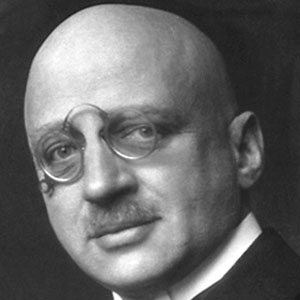Quick Facts

| Full Name | Fritz Haber |
| Occupation | Chemist |
| Date Of Birth | Dec 9, 1868(1868-12-09) |
| Age | 158 |
| Date Of Death | 1934-01-29 |
| Birthplace | Wrocław |
| Country | Poland |
| Birth City | Lower Silesian Voivodeship |
| Horoscope | Sagittarius |
Fritz Haber Biography
| Name | Fritz Haber |
| Birthday | Dec 9 |
| Birth Year | 1868 |
| Place Of Birth | Wrocław |
| Home Town | Lower Silesian Voivodeship |
| Birth Country | Poland |
| Birth Sign | Sagittarius |
| Spouse | Charlotte Nathan , Clara Immerwahr |
| Children(s) | Hermann Haber, Ludwig Fritz Haber, Eva Lewis |
Fritz Haber is one of the most popular and richest Chemist who was born on December 9, 1868 in Wrocław, Lower Silesian Voivodeship, Poland. He is referred to as being known to be the Father of Chemical Warfare for his work employing poisonous gases in World War I. He was awarded the Nobel Prize in Chemistry in 1918 for the synthesis of ammonia which was crucial to the creation of fertilizers and explosives.
He was awarded the Nobel Prize in Chemistry in 1918, just a decade after He won the Nobel Prize in Chemistry in 1918, a decade after Ernest Rutherford did. did.
He got married to his fellow chemical scientist Clara Immerwahr in 1901.
Fritz Haber Net Worth
| Net Worth | $5 Million |
| Source Of Income | Chemist |
| House | Living in own house. |
Fritz Haber is one of the richest Chemist from Poland. According to our analysis, Wikipedia, Forbes & Business Insider, Fritz Haber 's net worth $5 Million. (Last Update: December 11, 2023)
He was born into an Hasidic Jewish family.
The production of food for the vast majority of the world’s population is based on his method of making fertilizer using synthesized ammonia which he invented.
Height, Weight & Body Measurements
Fritz Haber height Not available right now. Fritz weight Not Known & body measurements will update soon.
Who is Fritz Haber Dating?
According to our records, Fritz Haber married to Charlotte Nathan , Clara Immerwahr. As of December 1, 2023, Fritz Haber’s is not dating anyone.
Relationships Record : We have no records of past relationships for Fritz Haber. You may help us to build the dating records for Fritz Haber!
Facts & Trivia
Fritz Ranked on the list of most popular Chemist. Also ranked in the elit list of famous people born in Poland. Fritz Haber celebrates birthday on December 9 of every year.
Top Facts about Fritz Haber
- Fritz Haber was a German chemist born in 1868.
- He won the Nobel Prize in Chemistry in 1918.
- Haber developed the process for synthesizing ammonia.
- His work led to the production of fertilizers and explosives.
- Haber also played a role in developing chemical warfare during WWI.
- He was Jewish but converted to Christianity to advance his career.
- Haber’s wife committed suicide due to his involvement with chemical warfare.
- He died in exile in Switzerland in 1934.
- Haber’s legacy is controversial due to his contributions to chemical warfare.
- His work paved the way for modern industrial chemistry and agriculture.
What is Fritz Haber most famous for?
In 1918, Haber would be awarded the Nobel Prize in chemistry for his work in developing a method of synthesizing ammonia from nitrogen in the air —the process that enabled the production of fertilizer in quantities that revolutionized agriculture worldwide.
Is Fritz Haber a good person?
Clara loved Haber not just for his mind and his success, but for his other endearing qualities. He was a gregarious and outgoing man who loved good jokes. He was also loyal and devoted to his friends. Later in life, he would help his close friend and collegue Albert Einstein through Einstein’s divorce.
What did Fritz Haber invent?
Haber process
Why did Fritz Haber win the Nobel Peace Prize?
Haber was awarded the Nobel Prize in 1918 for his work on ammonia synthesis. The process he developed – now known as the Haber process – fixes nitrogen from the air to make ammonia, which can be used to make synthetic fertilisers.
Who invented the poison gas in ww1?
The German gas warfare program was headed by Fritz Haber (1868 – 1934) whose first try for a weapon was chlorine, which he debuted at Ypres in April 1915.